Key takeaways:
- Mentorship training is fundamentally about building trust and meaningful relationships, facilitating personal and professional growth.
- Key benefits include personal growth, enhanced networks, and improved performance driven by accountability and motivation.
- Effective mentorship requires skills such as active listening, empathy, and adaptability to meet individual mentee needs.
- Continuous improvement through feedback, new resources, and self-reflection ensures an evolving and effective mentorship experience.
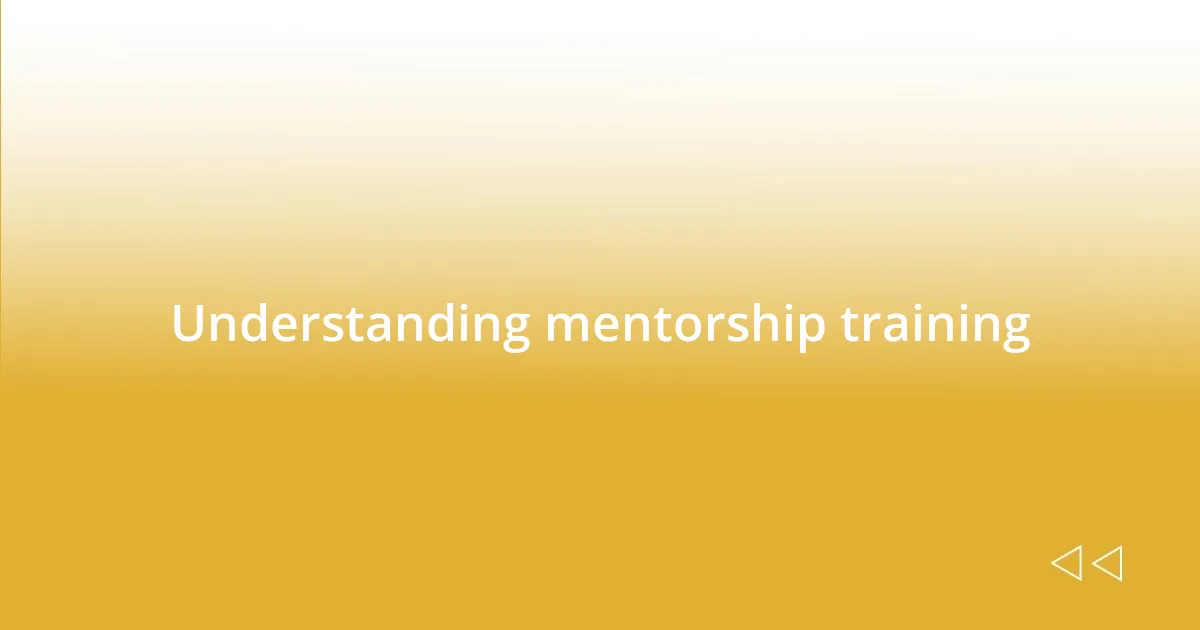
Understanding mentorship training
Mentorship training goes beyond simply teaching skills; it’s about fostering genuine relationships. I remember my first mentor, who not only guided me through professional challenges but also became a trusted confidant during tough times. Why does that connection matter so much? It’s because trust creates an environment where both mentors and mentees feel safe to share their aspirations and vulnerabilities.
At its core, mentorship training empowers individuals by providing them with tailored guidance that addresses their unique needs. I’ve experienced moments where specific advice helped me navigate complex situations that felt overwhelming at the time. Reflecting on that, I ask myself: how often do we truly slow down to consider what we need from our mentors? This awareness can greatly enhance the mentorship experience, leading to profound personal and professional growth.
Moreover, understanding mentorship training means acknowledging that it can be a two-way learning street. There were times when my mentees taught me invaluable lessons about resilience and adaptability. Isn’t it fascinating how mentorship evolves into a reciprocal exchange? This balance enriches the training, making it a powerful tool for continuous development for both parties involved.
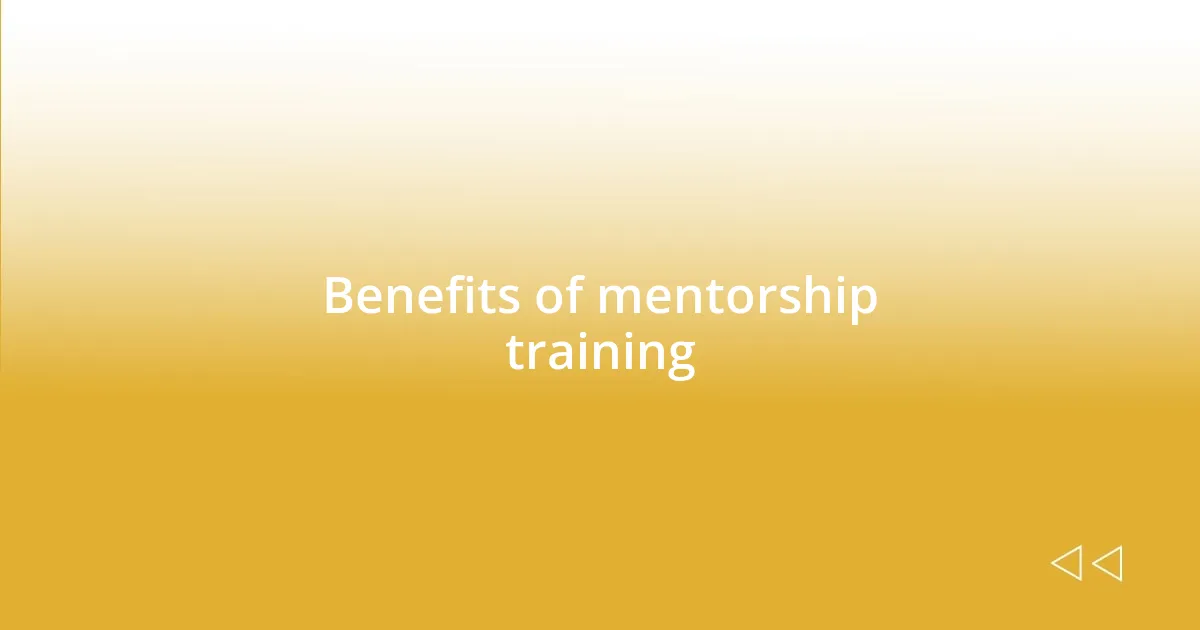
Benefits of mentorship training
Mentorship training serves as a catalyst for personal growth, allowing individuals to learn and develop not just professionally, but also personally. I recall a time when my mentor encouraged me to embrace my weaknesses rather than shy away from them. This transformative mindset shift sparked a newfound confidence in my abilities and helped me tackle challenges head-on, a benefit that’s hard to quantify but incredibly valuable.
Another substantial advantage of mentorship training is the enhancement of critical networks. When I experienced significant career shifts, my mentor connected me with industry insiders, opening doors I hadn’t even known existed. This showed me firsthand the power of having a strong, supportive network, and how mentorship can ignite those connections.
Additionally, mentorship training often leads to improved performance and productivity. I’ve noticed that after participating in such training, individuals tend to feel more accountable and motivated in their roles. They not only learn to set better goals but also develop strategies to achieve them—and that’s where the magic happens, as dedication meets direction.
| Benefit | Description |
|---|---|
| Personal Growth | Fosters confidence by encouraging a positive mindset and the embrace of weaknesses. |
| Network Enhancement | Leverages mentor connections to create valuable professional opportunities. |
| Increased Performance | Drives accountability and motivation, leading to better goal setting and achievement. |

Skills essential for effective mentorship
To be an effective mentor, several key skills come into play. From my experience, active listening has been one of the most crucial skills I’ve developed. It’s not just about hearing what the mentee says; it’s about truly understanding their feelings and perspectives, which in turn fosters a deeper connection. I recall a mentee who faced significant self-doubt; by listening intently, I was able to help them identify their strengths, which ultimately transformed their outlook.
Here’s a concise list of essential skills for effective mentorship:
- Active Listening: Engaging fully with the mentee’s thoughts and feelings.
- Empathy: Connecting emotionally to understand the mentee’s experiences.
- Communication: Clearly conveying thoughts and ideas in a supportive manner.
- Patience: Understanding that growth and understanding take time.
- Feedback: Providing constructive criticism that encourages improvement.
Moreover, adaptability is vital. Every mentee is different, and what works for one may not resonate with another. I had a mentee who thrived on structured guidance, while another preferred an exploratory approach. Adjusting my style to meet their needs not only strengthened our relationship but also enriched their learning experience. The ability to shift gears and respond to individual requirements is what truly defines a successful mentor.
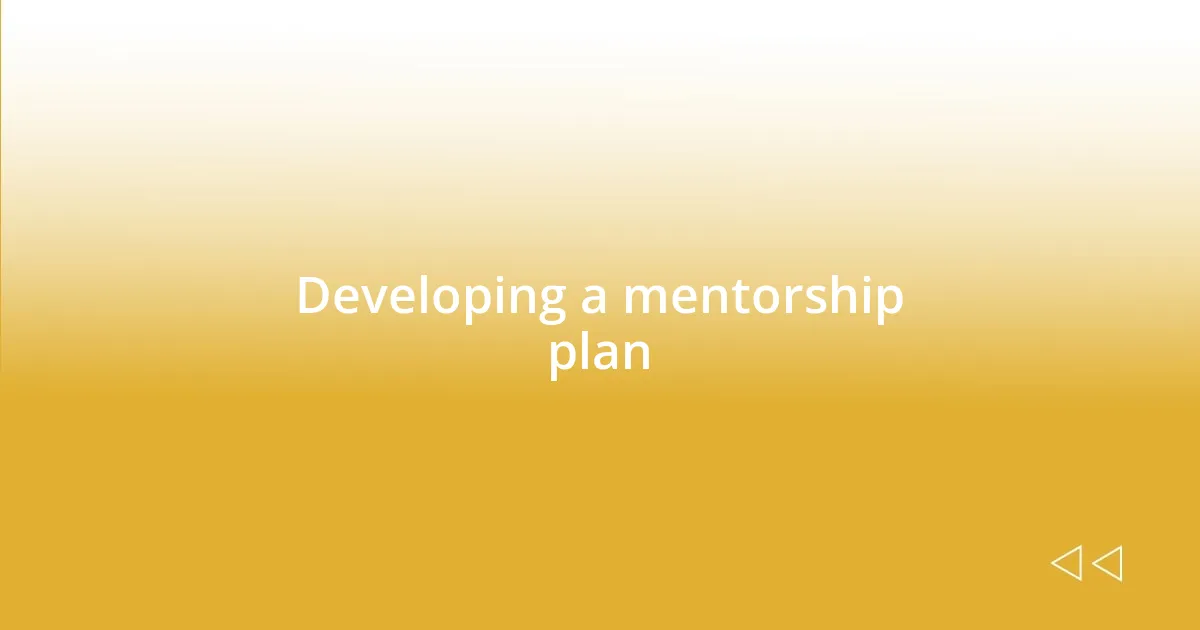
Developing a mentorship plan
When developing a mentorship plan, it’s crucial to start with clear objectives. I remember when I created my first mentorship plan – it felt daunting, but I knew that defining tangible goals was the foundation of our relationship. What do I want to achieve, and how can my mentor guide me? These questions prompted me to lay out specific, actionable steps, enhancing my focus and motivation.
Assessing the needs of both the mentor and mentee is another essential element. In my experience, an effective plan considers individual strengths and areas for growth. For instance, during a mentorship I took part in, we conducted a thorough strengths assessment that unveiled insights I hadn’t recognized in myself. This introspection not only directed our discussions but also made the journey much more meaningful.
Lastly, regular check-ins are a must. I’ve found that consistent feedback loops keep both parties accountable and engaged. Reflecting on a mentorship where we scheduled monthly reviews really changed the game for us. Each session was an opportunity to recalibrate our goals, celebrate progress, and address challenges. How can we refine our approach if we don’t pause to reflect? That’s the crux of effective mentorship planning.
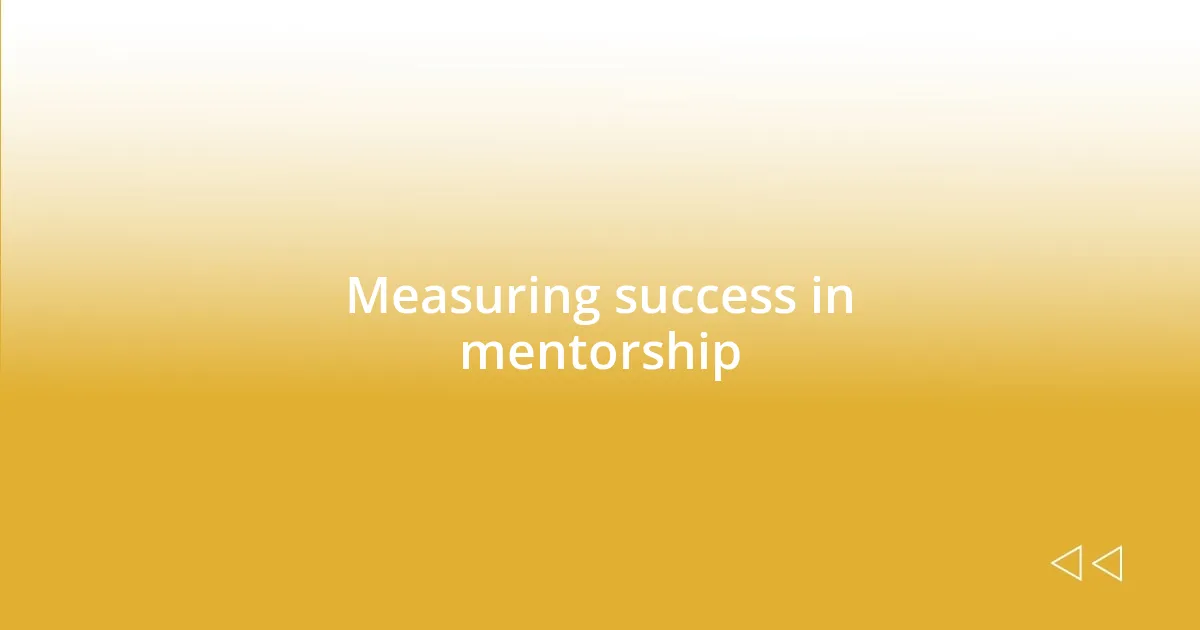
Measuring success in mentorship
Measuring success in mentorship can be a nuanced process, often rooted in the personal growth of the mentee. I vividly recall a mentee who, at the outset of our journey, struggled to assert their ideas in team meetings. Watching them gradually gain confidence, voicing their thoughts clearly and even taking the lead on projects, felt immensely rewarding. Isn’t it incredible how mentorship can ignite such profound transformations?
Another crucial metric of success lies in the feedback we exchange. After every session, I would ask my mentee to share their thoughts on our conversation. I remember one instance where they expressed how much they valued my honesty but also highlighted areas where they felt overwhelmed. This candid exchange not only helped me refine my mentoring approach but also empowered them to articulate their needs. Is there a greater indicator of success than seeing someone feeling safe to express themselves?
Lastly, long-term impact should not be underestimated. I often think about the mentees I’ve guided, many of whom have pursued paths I may never have anticipated, thriving in fields like entrepreneurship or social advocacy. Success, in my eyes, is when a mentee takes the skills we’ve honed together and applies them in unexpected ways. How fulfilling is it to know that your guidance played a part in their journey?
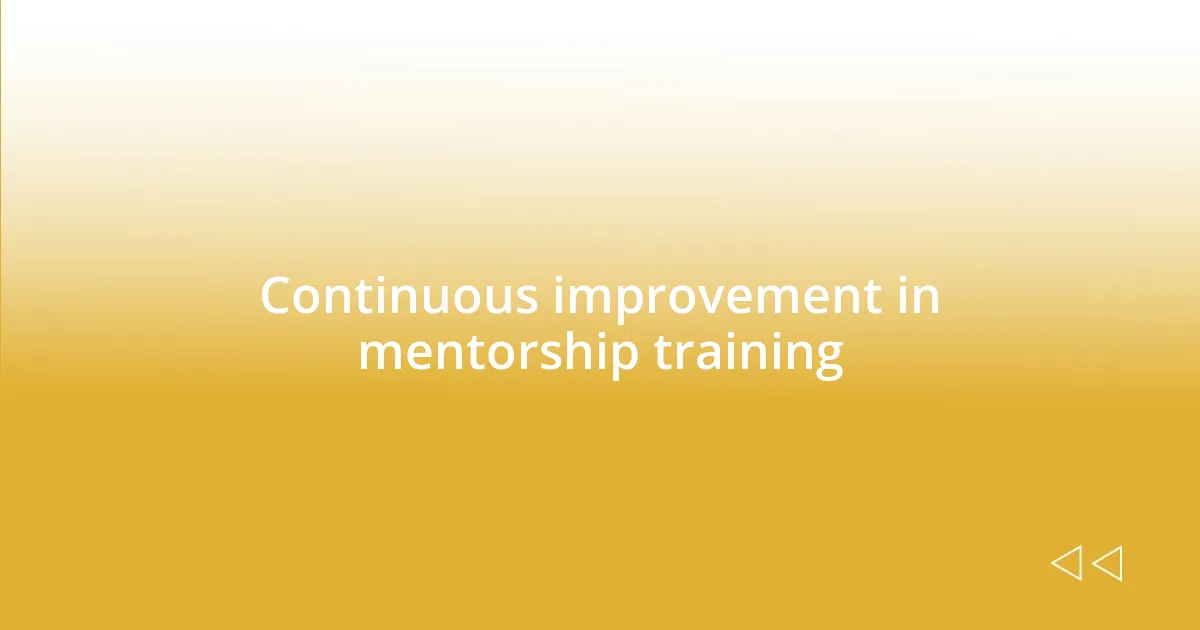
Continuous improvement in mentorship training
Continuous improvement in mentorship training is essential for keeping the relationship dynamic and effective. I recall a mentorship program I participated in that implemented a feedback mechanism not just for mentees but also for mentors. This two-way street allowed us to grow together, fostering an environment where we could openly discuss what worked and what didn’t. Have you ever considered how such candid conversations could shape the evolution of a mentorship?
Another valuable aspect is the advent of new resources and technologies. I remember when a colleague introduced me to an online platform that offered webinars and workshops tailored for mentors. Integrating these resources into our sessions expanded our toolkit and enriched our discussions. Isn’t it fascinating how technology can break barriers and enhance our learning experience?
Finally, self-reflection plays a pivotal role in continuous improvement. After each mentorship session, I like to take some time to reflect on what I did well and where I could have been more effective. I remember a particularly challenging session where I struggled to connect with my mentee’s concerns. This prompted me to read up on empathy and communication strategies, proving that growth often comes from our toughest moments. How can we improve if we don’t take the time to learn from our experiences?













